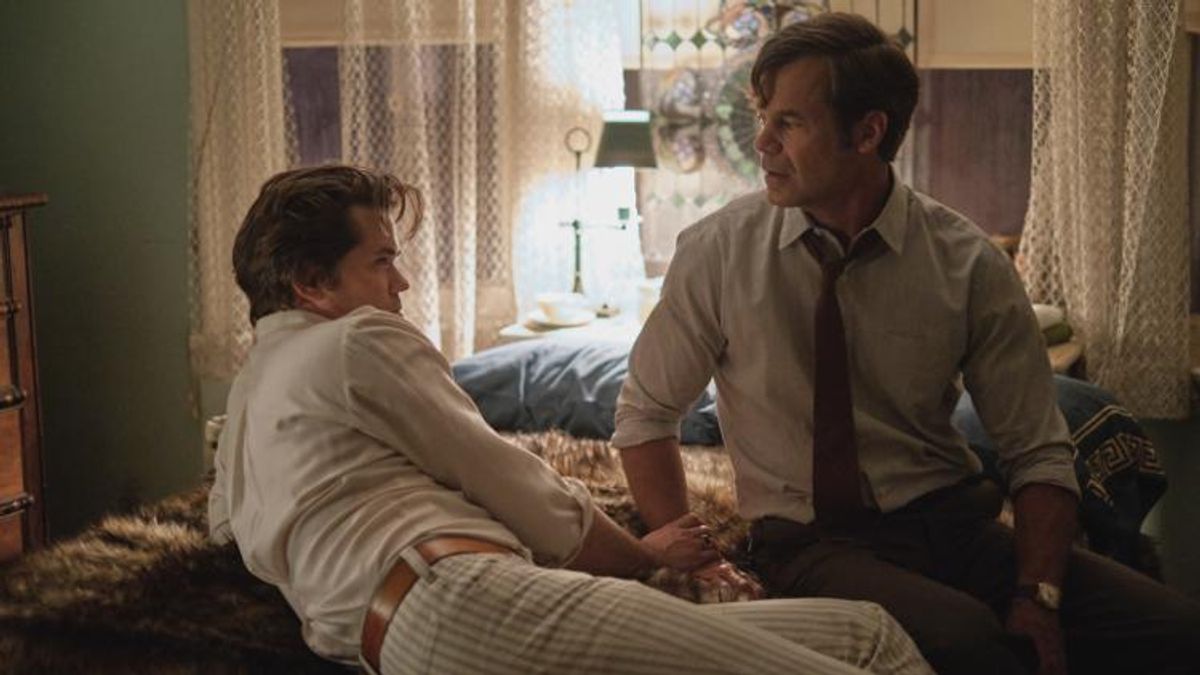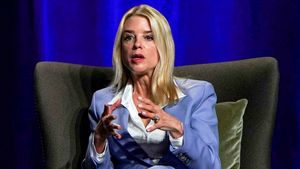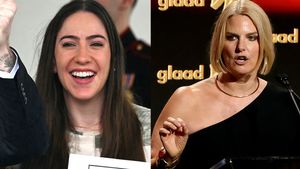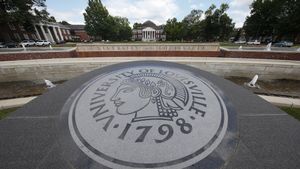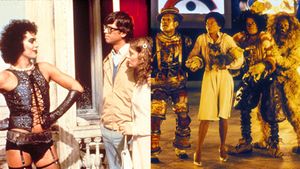Even before the pandemic, Andrew Rannells and Tuc Watkins spent a lot of time together. Having first met playing boyfriends in the 2018 Broadway revival of Mart Crowley's The Boys in the Band, it wasn't until they were doing publicity for the show that they discovered a genuine spark with one another. The pair went on to play lovers in the Showtime dark comedy series Black Monday, and then teamed-up again for the recent Netflix film adaptation of TBITB.
Speaking this summer from their home, where they live with Watkins's two children, the couple shared their thoughts on gay rights, open relationships, and whether a modern day-set TBITB could work.
Out: How are you faring during lockdown?
Andrew Rannells: We're here in Los Angeles. I was in New York until the end of March and was supposed to be starting work. The kids are out of school so here we are about to start that again. We're home-schooling and we became camp counselors and now we're back to the school thing.
Was it easy to nail your takes on TBITB film since you're all from the Broadway production?
AR: There was a huge benefit having done the Broadway show. The script was pretty much the same. Everyone remembered what we did the summer before, so everyone knew their lines. But with the film, we got to explore different aspects of the characters; in most ways, I don't think the performances were the same.
Tuc Watkins: I feel like we all showed up [to the movie] ready to go. It's almost as if the five-month run on Broadway was a precursor to the movie. What was different was the production design in the movie leaned into the era. So, the costumes, set, hair were more of the era, more of the '60s.
Do you have a preference for live or taped performances?
AR: Obviously you're not getting the immediate gratification of a live audience [when filming a movie] and hearing the response of the audience and feeding off that energy. I personally very much miss that, but the flip side of that is that we get to explore some very small, intimate moments on camera that we couldn't play on stage. So, we all got to refine our characters, especially with Tuc and my characters and how they interact with each other. There were certainly benefits to both.
TW:Boys in the Band was the first play I was ever in that I wished would never end. With every play I was ever in, all the way back to high school, I was ready to move on and do the next thing. I had no reservations about doing the movie because the play was so fun as an experience and important in its message.
AR: Agreed.
Your two TBITB characters have different feelings on fidelity. Do you think gay attitudes on commitment have evolved since the late 1960s?
AR: My character Larry is very much interested in opening up the relationship and Tuc's character of Hank is very much into monogamy and keeping the relationship between the two people. So, we argue back and forth most of the play. I just thought it was interesting when I was reading the script how this is very much a conversation my friends and I have today. It's a testament to how timely Mart's work is.
TW: With the sexual revolution of the '60s everything was sort of open and free and then with the AIDS crisis, things got really scary and closed up again. Now, in the age of PrEP and medication that can take care of disease, things seem to be opening up again. You can kind of track it on a graph. But it obviously comes down to individual preference and I think open relationships probably work for those who it works for. But for someone who doesn't strive for that, trying to make that work is difficult.
AR: All anyone can do in a relationship is try your best and see where it goes. That's where Larry and Hank are left at the end of the play. It's about communication.
Is gay culture more open to non-traditional relationships, not just open relationships but, say, things like kinks or age differences?
TW: With relationships outside the American norm, and gay relationships are outside that norm, we aren't handed down this set of dogmatic rules of what we must or must not do. Just by that variable the window is a little wider and as you experience a relationship and grow up and find what works for you and what doesn't, you leave bodies in your wake.
AR: I'm regularly blown away by younger people; the understanding and nuance and acceptance that younger people have. Today there is a larger spectrum being discussed about what relationships can be.
Both of you have played gay characters in different eras. Do you factor in how society generally viewed gays at the specific time when you build a character?
TW: In TBITB, I was playing a gay dad, a man who left his wife and children. I think to myself what would it be like for me to leave my children in order to live an authentic life and experience that pain and how must it have been magnified because he would have been so vilified. The cost today wouldn't carry the same weight.
AR: With TBITB, we had to remind ourselves this was pre-Stonewall; the laws that existed then and the fact that the modern gay rights movement hadn't begun. So, these were things we talked about -- the dancing laws, the outside danger of neighbors. There are dangers inside and outside the apartment. Like when the doorbell rings and all the characters freeze [out of fear]. I had to periodically remind myself of that fear.
TW: This movie is a history lesson. Any freedom I feel as a gay person is because of what these guys in this play and movie went through.
Could TBITB be set in the 2020s?
AR: At the core of that show the characters still struggle with things many people struggle with today. There are things still very relevant. But I don't know, I feel like there are so many new voices coming out now that there are so many spaces to tell new stories. I wouldn't want to update it.
TW: Updating The Boys in the Band, undermines The Boys in the Band. It was written in 1968 to reflect what was happening in 1968. It was as if Mart Crowley drilled a hole into a wall in this apartment and allowed the audience to view what was private. It's important to see what that was like in 1968 so we don't make the same mistakes -- to see what happens when you don't let people be their authentic selves and how that hurts them, and how when you don't tell people around you that you love them, it can be catastrophic.
